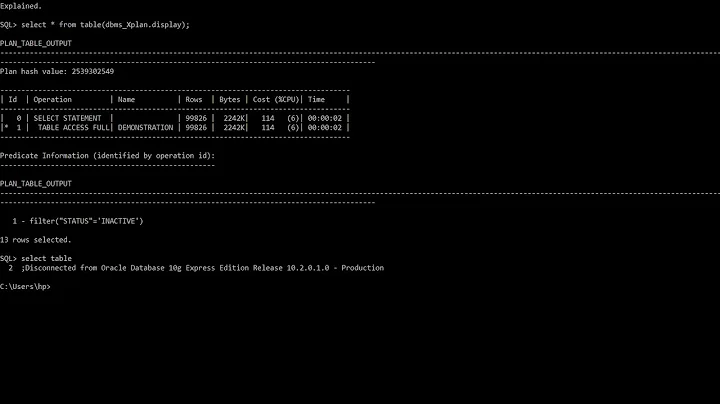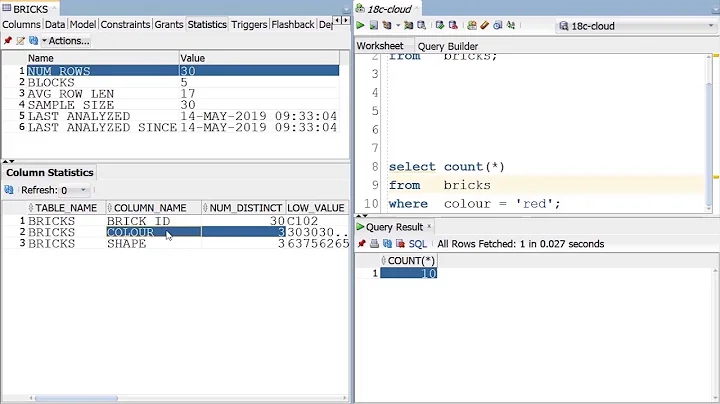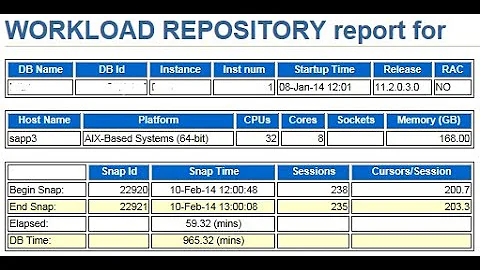How often should Oracle database statistics be run?
Solution 1
At my last job we ran statistics once a week. If I remember correctly, we scheduled them on a Thursday night, and on Friday the DBAs were very careful to monitor the longest running queries for anything unexpected. (Friday was picked because it was often just after a code release, and tended to be a fairly low traffic day.) When they saw a bad query they would find a better query plan and save that one so it wouldn't change again unexpectedly. (Oracle has tools to do this for you automatically, you tell it the query to optimize and it does.)
Many organizations avoid running statistics out of fear of bad query plans popping up unexpectedly. But this usually means that their query plans get worse and worse over time. And when they do run statistics then they encounter a number of problems. The resulting scramble to fix those issues confirms their fears about the dangers of running statistics. But if they ran statistics regularly, used the monitoring tools as they are supposed to, and fixed issues as they came up then they would have fewer headaches, and they wouldn't encounter them all at once.
Solution 2
Since Oracle 11g statistics are gathered automatically by default.
Two Scheduler windows are predefined upon installation of Oracle Database:
- WEEKNIGHT_WINDOW starts at 10 p.m. and ends at 6 a.m. every Monday through Friday.
- WEEKEND_WINDOW covers whole days Saturday and Sunday.
When statistics were last gathered?
SELECT owner, table_name, last_analyzed FROM all_tables ORDER BY last_analyzed DESC NULLS LAST; --Tables.
SELECT owner, index_name, last_analyzed FROM all_indexes ORDER BY last_analyzed DESC NULLS LAST; -- Indexes.
Status of automated statistics gathering?
SELECT * FROM dba_autotask_client WHERE client_name = 'auto optimizer stats collection';
Windows Groups?
SELECT window_group_name, window_name FROM dba_scheduler_wingroup_members;
Window Schedules?
SELECT window_name, start_time, duration FROM dba_autotask_schedule;
Manually gather Database Statistics in this Schema:
EXEC dbms_stats.gather_schema_stats(ownname=>NULL, cascade=>TRUE); -- cascade=>TRUE means include Table Indexes too.
Manually gather Database Statistics in all Schemas!
-- Probably need to CONNECT / AS SYSDBA
EXEC dbms_stats.gather_database_stats;
Solution 3
Whenever the data changes "significantly".
If a table goes from 1 row to 200 rows, that's a significant change. When a table goes from 100,000 rows to 150,000 rows, that's not a terribly significant change. When a table goes from 1000 rows all with identical values in commonly-queried column X to 1000 rows with nearly unique values in column X, that's a significant change.
Statistics store information about item counts and relative frequencies -- things that will let it "guess" at how many rows will match a given criteria. When it guesses wrong, the optimizer can pick a very suboptimal query plan.
Solution 4
What Oracle version are you using? Check this page which refers to Oracle 10:
http://www.acs.ilstu.edu/docs/Oracle/server.101/b10752/stats.htm
It says:
The recommended approach to gathering statistics is to allow Oracle to automatically gather the statistics. Oracle gathers statistics on all database objects automatically and maintains those statistics in a regularly-scheduled maintenance job.
Solution 5
When I was managing a large multi-user planning system backed by Oracle, our DBA had a weekly job that gathered statistics. Also, when we rolled out a significant change that could affect or be affected by statistics, we would force the job to run out of cycle to get things caught up.
Related videos on Youtube
Admin
Updated on July 09, 2022Comments
-
 Admin almost 2 years
Admin almost 2 yearsIn your experience, how often should Oracle database statistics be run? Our team of developers recently discovered that statistics hadn't been run our production box in over 2 1/2 months. That sounds like a long time to me, but I'm not a DBA.





